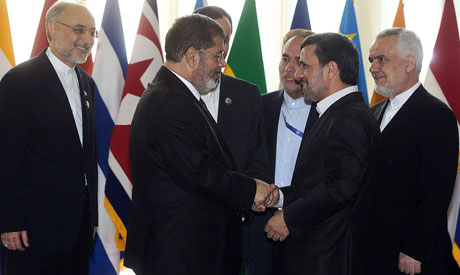By Carlo Ungaro (about the author)
opednews.com
In November 2001, as newly appointed head of the Italian Diplomatic Delegation for Somalia, inNairobi, I began a very active participation in a Peace Conference which was designed to complete Somalia's transition to stable, credible and internationally recognized Government.
This lengthy and complicated peace progress, which lasted well into the year 2004, was fatally marred, in my view, by some hasty decisions taken at its very conclusion. These took little account of the lengthy and patient negotiations which had preceded them and possibly were dictated by funding problems, as well as strong pressure by the Ethiopian Government, eager to reach a conclusion seen as favourable to Ethiopian interests. The end result, therefore, appeared to me, already then, as fundamentally flawed, and unlikely to bring more than a temporary respite to the political turmoil in Somalia.
Even so, it is disheartening to realise that all those months of careful, finely-balanced talks, with their dramatic and at times highly emotional interludes, would end up with the current situation, in which, eight years on, little significant political progress is visible.
Most commentators, quite commendably, are attempting to put a brave, optimistic face on this latest act in the Somali drama, but grounds for optimism appear scant and weak, and it is difficult to see what this new "Transitional Federal Government" will be able to achieve, outside of the areas it can control. It is certainly worth considering the eloquent fact that the election of the new President, by a carefully balanced Parliament takes place in theMogadishu airport, under heavy guard by foreign troops, and not, as would be expected, in the beleaguered Capital itself.
When the Nairobi Conference began, Somalia already had a "Transitional National Government", the result of intense previous negotiations in neighbouring Djibouti, which, however, was viewed with suspicion and hostility by some powers and was therefore unable to gain the international recognition it aspired to.
Somalia has traditionally been a difficult land, hard to govern because of its clan structure. Italian and British explorers found this in the course of their colonial experience there, and, in their dealings with Abdullah Hassan, known as the "Mad Mullah", in the early years of the last century. It is interesting to note that a memorial to the "Mad Mullah" exists in Mogadishu.
The recent, unexpected, death of Ethiopian Prime Minster Meles Zenawi will certainly further complicate the situation. The negative developments within Somalia, in the past two decades, owed a lot to Zenawi's obsessive interest in being the prime mover of events there. He was among the first of the U.S. (and the "West's") "client" leaders to understand that the path to continued support no longer lay in raising the spectre of Communism, but rather the spectre of "Islamic extremism". And it is certain that the tragic events of September 11, 2001, helped him a great deal in his endeavour to sow an atmosphere of unreasoning panic directed against Somali leaders, many of whom, in spite of their past as "war-lords", appeared to be involved in an effort to create, if not peaceful unity, at least a non violent coexistence among clans and power structures. His close ties with the Americans continued to this day, and some of the "drones" used against Islamic groups in Somalia are stationed in Ethiopia. It is probably no coincidence that the "electoral process" in Mogadishu seemed to stop in its tracks at the news of the Ethiopian leader's death.
It is not without a strong feeling of regret that one feels compelled to view potential future developments in Somalia -- and in the Horn of Africa -- with some pessimism and apprehension. Large sectors of Somali civil society -- and particularly the women of Somalia -- have put a great deal of effort and enthusiasm, sometimes very bravely, in the endeavour to find a solution, but the country appears destined to remain a pawn in the hands of outside interests.
The basic questions that need to be considered both by the more responsible Somalis and by those foreigners who have the country's welfare at heart, concerns the realistic possibility of actually finding a solution in Somalia along the lines proposed up to now. The examples of neighbouring Somaliland and of the very autonomous state of Puntland, appear to indicate that, perhaps, greater consideration should be given to the fact that "self government" in Somalia seems to work best in more reduced geographic areas, where the predominance of one clan can ensure acceptance of a leader who can then, on a footing of parity, establish working relationships with other leaders in what is, perhaps mistakenly, considered a necessarily unified geo-political entity, or a potential "Nation State".
The vast majority of Somalis, whether in their own land of abroad, show a deep love and loyalty to their country, and this is an element that has to be kept into account: Somalia is, perhaps rightly, seen as the quintessential example of a "Failed State", but its people deserve better, and fresh, unprejudiced thought needs to be dedicated to the problem..
I am a former, now retired, senior Italian diplomatic officer. I have spent many years (over 25) in Central Asia (sixteen in Afghanistan).
The views expressed in th








 Danish Deming Group (DDG) Somaliland looking for a Community Liaison Facilitator based in the field.
Danish Deming Group (DDG) Somaliland looking for a Community Liaison Facilitator based in the field.



 A Ugandan police officer serving with the African Union Mission in Somalia's first Formed Police Unit stands at the top of an armored personnel carrier at a police station in the capital Mogadishu,
A Ugandan police officer serving with the African Union Mission in Somalia's first Formed Police Unit stands at the top of an armored personnel carrier at a police station in the capital Mogadishu,